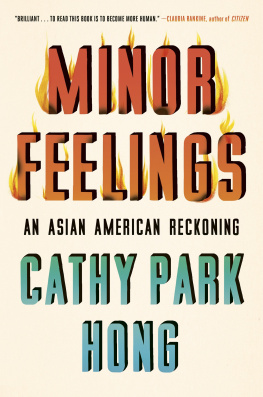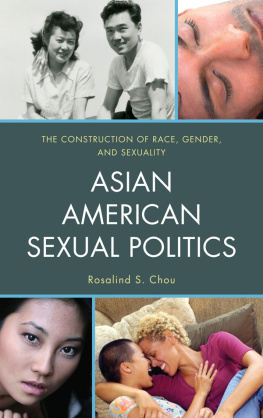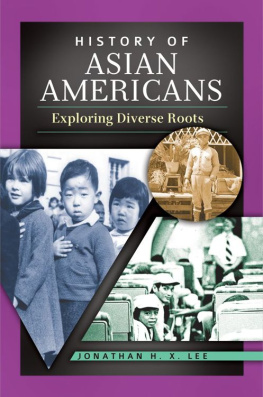Contents
Landmarks
Print Page List
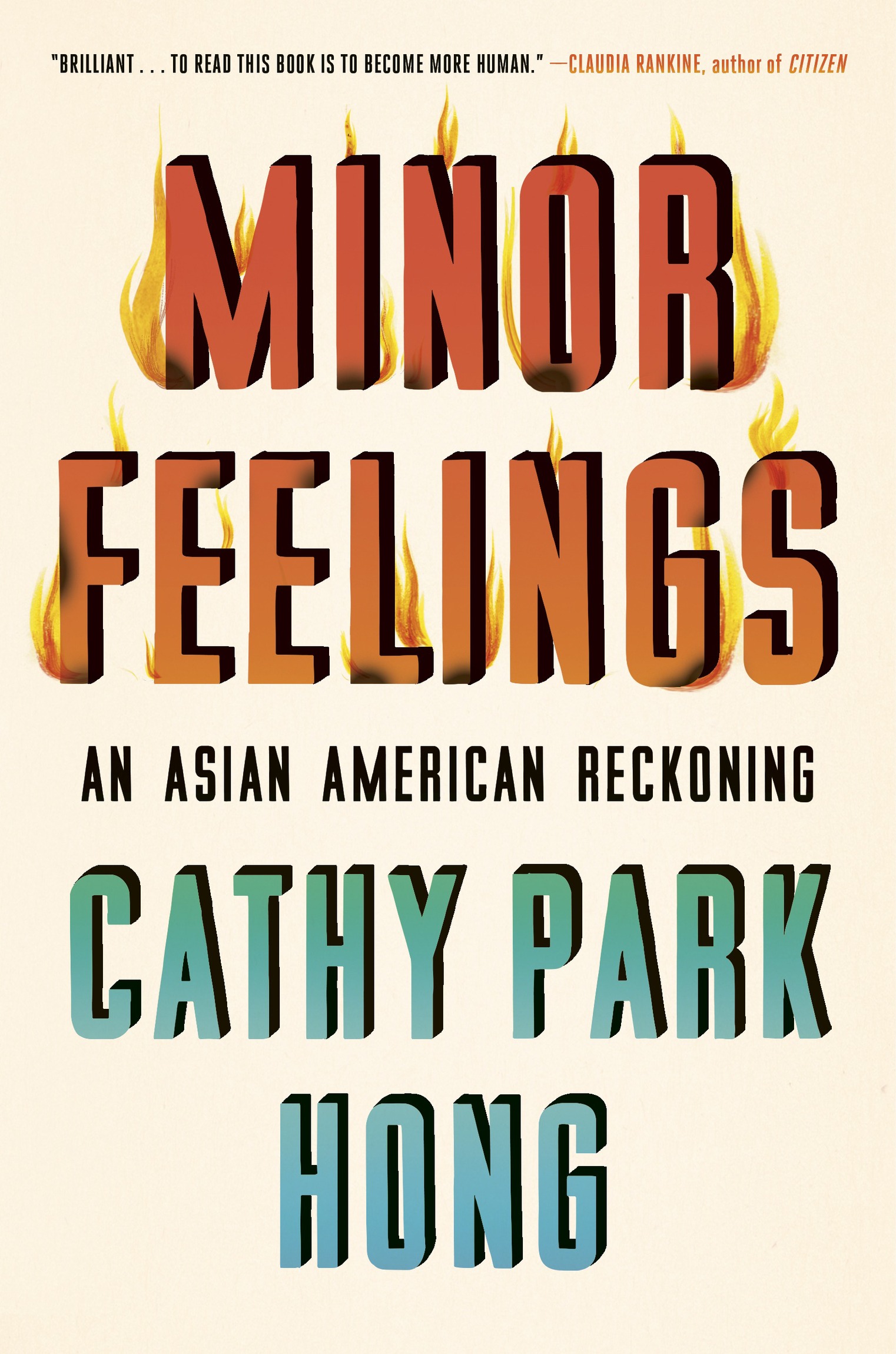
ADVANCE PRAISE FOR
MINOR FEELINGS
Cathy Park Hongs brilliant, penetrating, and unforgettable Minor Feelings is what was missing from our shelf of classics. She brings acute intelligence, scholarly knowledge, and recognizable vulnerability to the formation of a new school of thought she names minor feelings. In conversation with Sianne Ngais Ugly Feelings, Hong charts her emotional life as a Korean American immigrant woman, thereby shattering the concept of a single story of the Asian experience. Minor Feelings builds through what Hong names a racialized range of emotions, which are routinely dismissed by others. To read this book is to become more human.
C LAUDIA R ANKINE, author of Citizen
Cathy Park Hongs Minor Feelings truly delivers news we can use. It will educate some and inspire hallelujahs from others; people will productively argue with it, be inspired by it, think and feel with and around it. Hong says the book was a dare to myself, and she makes good on it: by writing into the heart of her own discomfort, she emerges with a reckoning destined to become a classic.
M AGGIE N ELSON , author of The Argonauts and Bluets
Minor Feelings is an essayistic investigation of those feelings so hard to name, a mix of the elusive, denied, unexpected, and unexploreda fierce catalogue of that which has not been named and yet wont be ignored; an electric intervention, a provocation, and a renewal.
A LEXANDER C HEE , author of How to Write an Autobiographical Novel
I seldom finish a book and say we are not ready for what I just read. But we are so not ready for what Cathy Park Hong does in Minor Feelings. And thankfully, she does not care whether we are ready or not. Minor Feelings seals intellectual cracks while patiently revealing emotional and national secrets I was afraid and unwilling to name. Few books change how we talk to each other and whisper to ourselves. Minor Feeling is one of those books that changes the language we use to reckon, to talk, to write, and to hide. Cathy Park Hong sees us. Her vision and execution are so breathtaking. And so genius. And so absolutely scary. Read it. Reread it. It will read you.
K IESE L AYMON , author of Heavy
Cathy Park Hongs book is tremendous. The entire time I read, I was hissing yes and yes and YESSSSS and letting my minor feelings become major feelings, which I think is the glory of a book like thisit takes all the parts of us that we can barely account for and gives them back fully recognized. It felt like having someone sit me down in a chair and say Your feelings are real and This is how we got here and Here is a way out all at once. It broke my heart with relief.
M IRA J ACOB , author of Good Talk and The Sleepwalkers Guide to Dancing
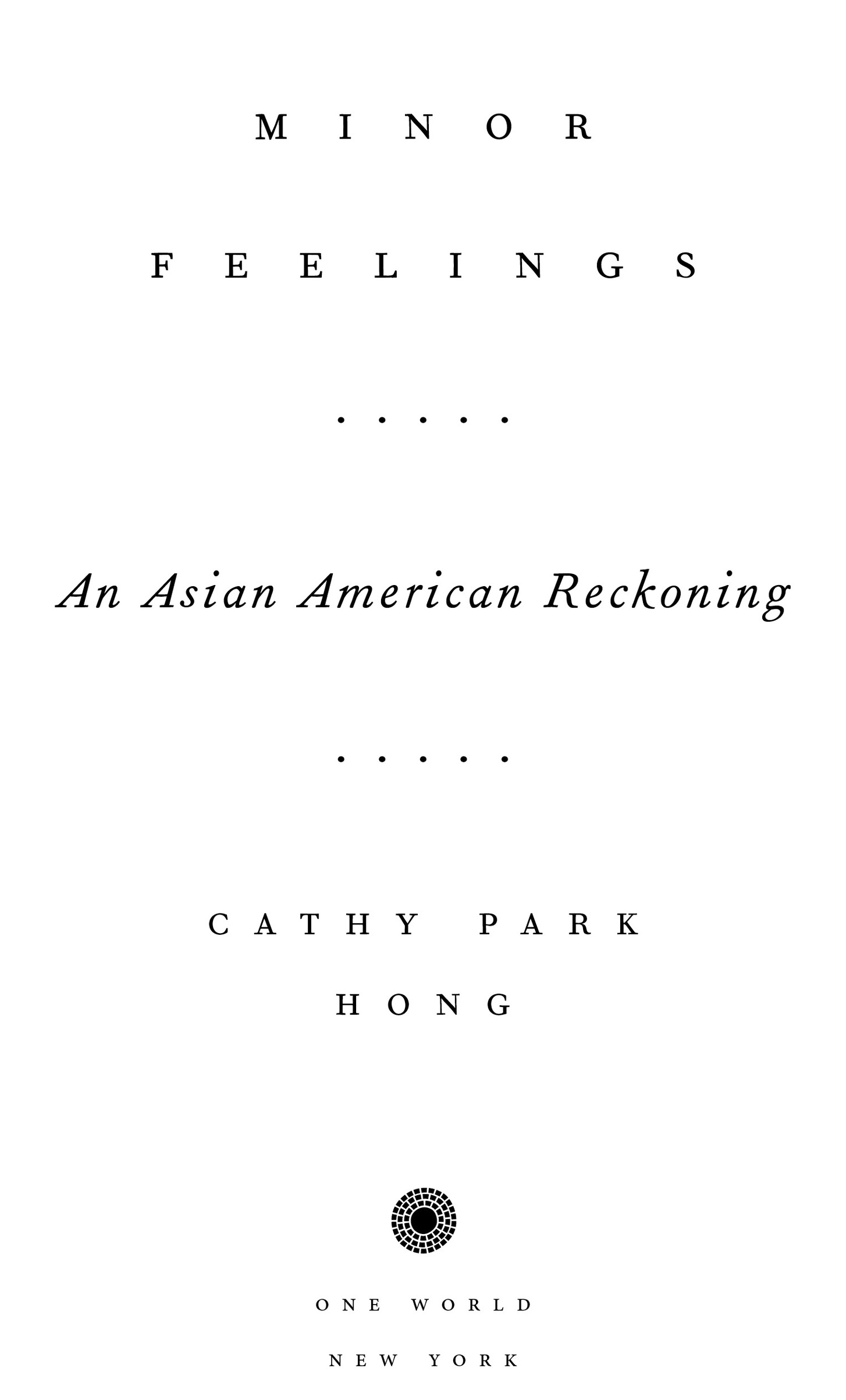
Minor Feelings is a work of nonfiction. Some names and identifying details have been changed.
Copyright 2020 by Cathy Park Hong
All rights reserved.
Published in the United States by One World, an imprint of Random House, a division of Penguin Random House LLC, New York.
O NE W ORLD is a registered trademark and its colophon is a trademark of Penguin Random House LLC.
L IBRARY OF C ONGRESS C ATALOGING-IN- P UBLICATION D ATA
N AMES: Hong, Cathy Park, author. T ITLE: Minor feelings : an Asian American reckoning / Cathy Park Hong. D ESCRIPTION: New York : One World, 2020. I DENTIFIERS: LCCN 2019033869 (print) | LCCN 2019033870 (ebook) | ISBN 9781984820365 (hardcover) | ISBN 9781984820372 (ebook) S UBJECTS: LCSH: Hong, Cathy Park. | Asian AmericansBiography. | Asian American womenBiography. | Poets, American21st centuryBiography. C LASSIFICATION: LCC E184.O6 H64 2020 (print) | LCC E184.O6 (ebook) | DDC 305.4895/073dc23
LC record available at https://lccn.loc.gov/2019033869
LC ebook record available at https://lccn.loc.gov/2019033870
Ebook ISBN9781984820372
oneworldlit.com
Book design by Barbara M. Bachman, adapted for ebook
Cover design: Na Kim
v5.4
ep
Contents
UNITED
M Y DEPRESSION BEGAN WITH AN imaginary tic.
For an hour, I stared at the mirror, waiting for my eyelid to flutter or the corner of my mouth to tingle.
Do you see my tic? I asked my husband.
No.
Do you see my tic now? I asked my husband.
No.
Do you see my tic now? I asked my husband.
No!
In my early twenties, I used to have an actual tic in my right eyelid that spread so that my right facial muscles contracted my eye into an occasional Popeye squint. I found out I had a rare neuromuscular condition called hemifacial spasm, triggered by two cranial nerves behind my ear that became twisted. In 2004, when I was twenty-six years old, a doctor in Pittsburgh corrected my spasms by inserting a tiny sponge to separate the two entwined nerves.
Now, seven years later, I was convinced my spasms had returnedthat somehow the sponge had slipped and my nerves had knotted themselves up again. My face was no longer my face but a mask of trembling nerves threatening to mutiny. There was a glitch in the machine. Any second, a nerve could misfire and spasm like a snaking hose hissing water. I thought about my face so much I could feel my nerves, and my nerves felt ticklish. The face is the most naked part of ourselves, but we dont realize it until the face is somehow injured, and then all we think of is its naked condition.
My self-conscious habits returned. I found elaborate ruses to hide my face in public, cradling my cheek against my hand as if I were in constant dismay, or looking away to quietly ponder a question about the weather when all I could think of was my ticklish nerves that could, any second, seize my face into a tic.
There was no tic.
It was my mind threatening mutiny. I was turning paranoid, obsessive. I wanted someone to unscrew my head and screw on a less neurotic head.
Stinking thinking, my husband called my thinking.
To try to fall asleep, I ingested whiskey, then whiskey with Ambien, then whiskey with Ambien, Xanax, and weed, but nothing could make me sleep. When I could not sleep, I could not think. When I could not think, I could not write nor could I socialize and carry on a conversation. I was the child again. The child who could not speak English.
I lived in a beautiful rent-stabilized loft on an unremarkable corridor of Lower Broadway known for its retail jeans stores that pumped out a wallpaper of Hot 97 hits. I was finally living the New York life I wanted. I was recently married and had just finished writing a book. There was no reason for me to be depressed. But anytime I was happy, the fear of an awful catastrophe would follow, so I made myself feel awful to preempt the catastrophes hitting. Overtaxed by this anxiety, I sank into deep depression. A friend said that when she was depressed, she felt like a sloth that fell from its tree. An apt description. I was dull, depleted, until I had to go out and interface with the public, and then I felt flayed.

